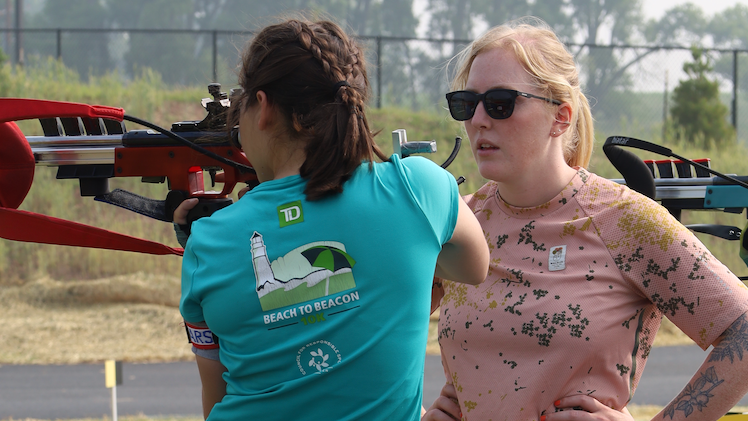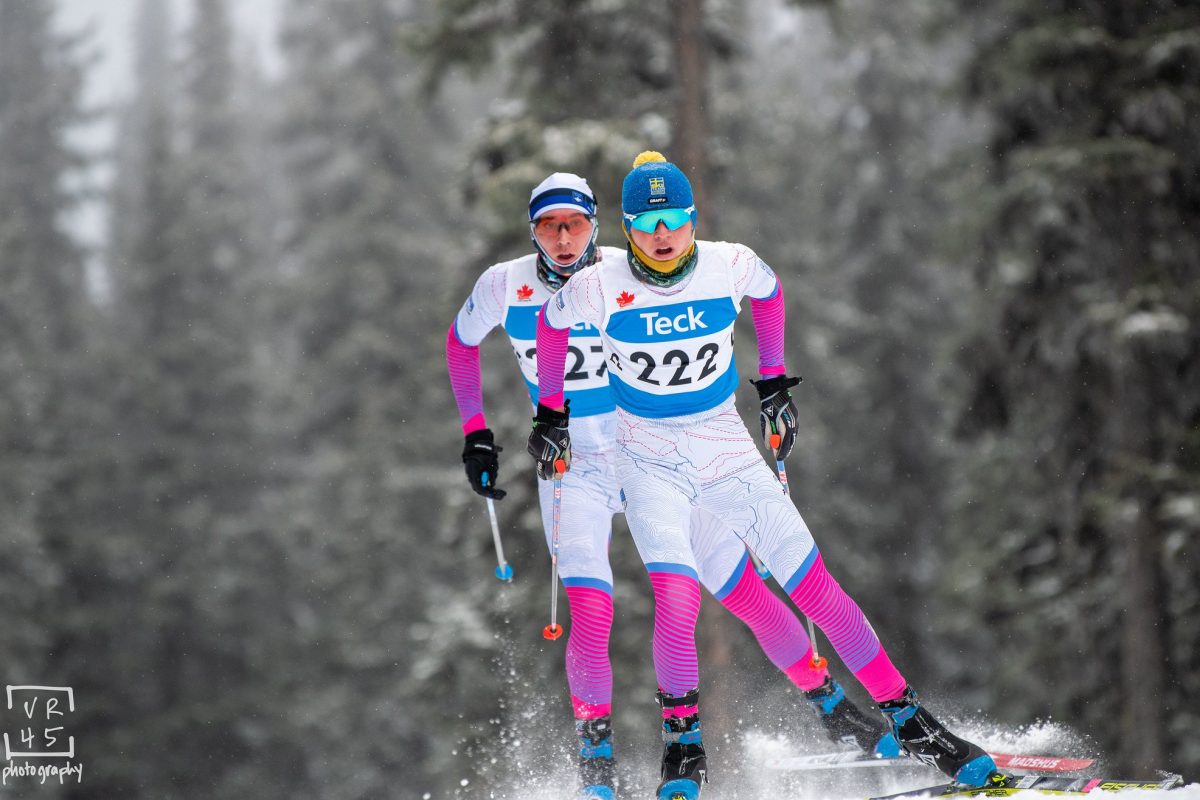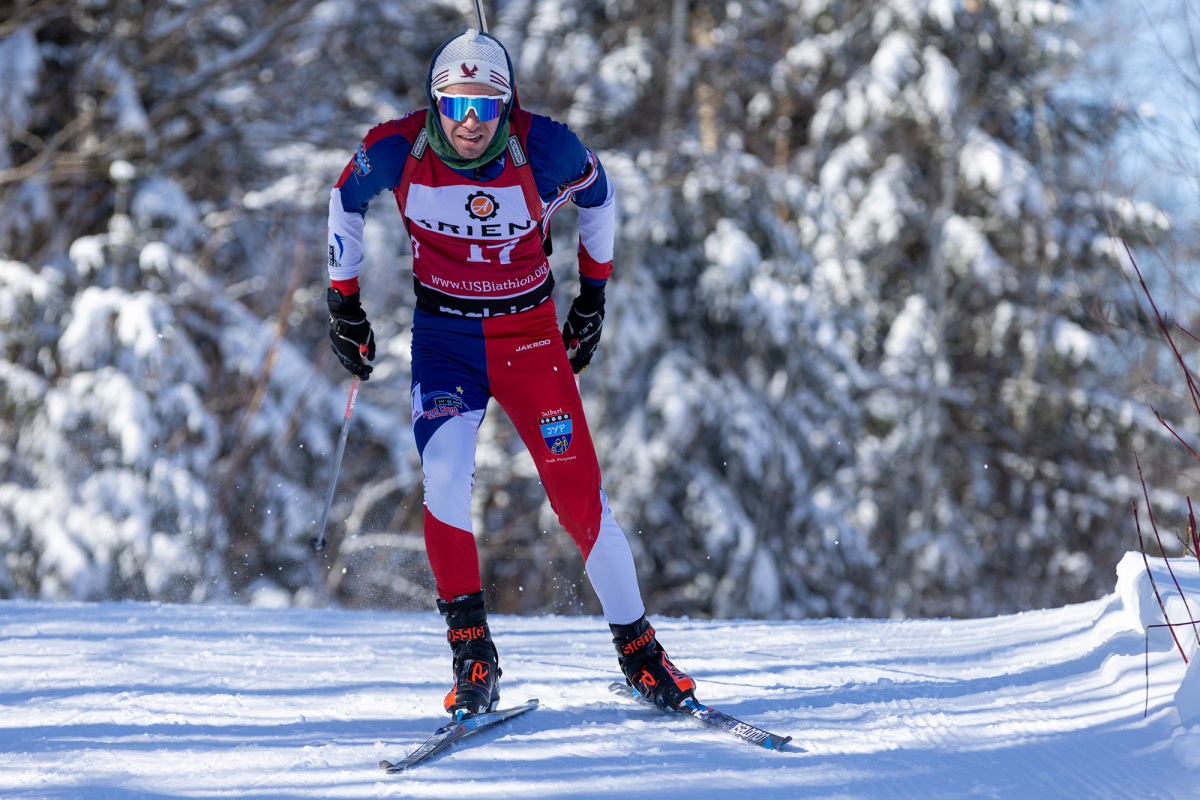
Today in Ostersund, Sweden, two women returned to the spots they’re used to occupying on the World Cup biathlon results sheet.
For Germany’s Magdalena Neuner, that spot was at the top. The 24-year-old won her 25th World Cup after placing third in a wind-dominated individual race earlier this week. For any other champion, an occasional bad day is standard. But Neuner is so good that seeing her finish over a minute and a half behind Darya Domracheva of Belarus was, well, strange.
In Saturday’s 7.5 k sprint, Neuner eked out a 0.2-second victory over Tora Berger of Norway. The pair both missed a single shot in the standing stage and were battling for the whole race; Neuner had the advantage of being later in the start order, so she knew exactly what she had to do in the last loop to win.
Neuner actually had a larger lead coming into her last shoot, but the wind – which has foiled racers all week – slowed her down.
“I had to wait quite a long time,” Neuner said in a press conference. “I had no choice, but then I had only one penalty so that was the right thing to do.”
Neuner and Berger are hands-down two of the best skiers on the circuit, and although Berger has only twelve wins to her name, they are frequent adversaries. In the press conference, they bickered about who would lead the way in Sunday’s pursuit.
“I will follow Magdalena,” Berger said, which is technically correct at least to start since she will have that 0.2-second deficit.
“We will see,” Neuner replied.
A bit farther down the results sheet, Zina Kocher also returned to the spot she’s used to. The Canadian has a World Cup podium and a handful of top-10 finishes to her name, but in 2011 she had only a single top-20 finish, placing 17th in a sprint in Slovenia. More often, she placed in the 50s or 60s – or even the 80s.
But only two races into the 2012 season, she’s already topped her best finish from the year before. Kocher placed 15th in the sprint despite three penalties.
“Every single race felt like a struggle last year, but I’ve just felt incredibly calm racing this week,” Kocher said in a Biathlon Canada press release. “I knew after the trials that my shape was much better than last year and that was a big relief. I’m just having a ton of fun.”
How did she get back on track? After losing her “A” team nomination, Kocher left the national team program and joined the new Biathlon Alberta training center with her very first coach, Richard Boruta. Kocher believes that the change was what she needed and explains a lot about her return to form.
“I needed a different environment that I positively felt confident in, to start with,” she wrote in an e-mail to FasterSkier.
But besides just feeling happy to rejoin Boruta, Kocher has been training differently this year.
“Definitely we upped the anti with high intensity volume, and this was key for me,” she said. “I seem to respond better to harder training and less long low intensity volume. Plus we worked more on technique with a focus on getting my poles forward, hips more forward, and gliding more.”
Whatever she’s done, it has worked. Kocher had the fifth-fastest ski time of the day and was the highest-placing racer with three penalties. She was actually 0.2 seconds faster on her skis than Berger, who jumped in the opening cross country World Cup earlier this year and finished fourth.
Kocher is that speedy, too.
“My body just wants to go and I feel great on the skis right now,” she said in the Biathlon Canada press release.
Kocher’s teammate Megan Imrie had a strong race of her own, finishing 33rd with two penalties. It was just the fifth time in her career that she has collected World Cup points – and in Thursday’s individual, she was 41st, just one spot outside the cutoff. To say that Imrie is off to a good start would be an understatement.
Rosanna Crawford, the third Canadian, placed 56th, meaning that all three team members will start tomorrow’s pursuit.

For the Americans, there was an unfamiliar face leading the way: Susan Dunklee.
While Dunklee has been a member of the national team for several years, this weekend was the first time she actually received World Cup starts. She’s made the most of it, finishing 45th on Thursday and then 28th today.
She may be new to the big show, but talking to her about the race, she acts like she’s already a veteran.
“[It was] blustery and it unexpectedly started blizzarding a few minutes before the start,” Dunklee wrote in an e-mail. Her solution? “I tried to shoot on a far right point in prone, where I would be protected from wind.”
Racing is racing is racing, and Dunklee has approached her first World Cups as if they are just any other competition. She’s learned from her brief experience, too. On Thursday, she started out with the third-fastest opening lap; today, her pace was more measured.
“I thought it might be good to try to pace my laps a little better this time,” she said. “Soon out of the start gate I fell in with a German coming out of the range, [Tina] Bachmann I think. I decided to ski with her for my first lap, as long as she was passing people.”
Dunklee did have a steadier effort, combining the 35th-fastest ski time of the day with a very respectable two penalties.
It’s one of the best debuts by a U.S. biathlete in years, and it says almost as much about U.S. biathlon as it does about Dunklee herself. Sara Studebaker, Lanny Barnes, and Laura Spector – who finished 46th, 65th, and 73rd today – all received World Cup starts early in their careers, in part because there were a smaller number of fast women in the country.
As soon as the women rose to the top of the American field, they were shipped off to Europe, where they placed 70th, 77th, and 62nd in their first races at the senior level.

Despite the rough early results, the strategy hasn’t been a bad one; all three have top-20 World Cup finishes under their belts. But the very fact that Dunklee didn’t make her World Cup debut until she was ready to excel shows that the U.S. team is getting deeper. Dunklee had to out-compete racers like Olympian Tracy Barnes and 2011 World Championship team member Annelies Cook to receive her spot on this year’s World Cup team.
“We as coaches want to keep the bar high and send the athletes out to the competitions when they are ready, either the IBU cup or the World Cup,” U.S. women’s coach Jonne Kahkonen told FasterSkier. “And Susan did exactly this path; more IBU cup races and European Champs last year, and this year she is ready to take the racing into the next level.”
Kahkonen was happy to see a new face leading the team after Spector and Studebaker were the driving forces behind last year’s results.
“It is good to see that there are others that are ready to take the next step,” he said. “This takes hopefully some pressure off of Sara and Laura.”
While none of the three older athletes had their best races today, the coach was confident that they would find their form. He mentioned that some of the team had been sick the previous week, and that while the women had managed to avoid falling ill, their immune systems may have been fighting something off.
Studebaker will start in tomorrow’s pursuit, with the goal of simply moving up as many places as possible.
“Just out of the points in today’s sprint,” she tweeted after the race. “Chance for redemption in tomorrow’s pursuit!”
For Dunklee, there’s no need for redemption. She’ll simply be out there having fun and continuing to chart new territory.
“I think half the battle happens before the start of the race,” she wrote. “I just want to feel relaxed and confident and let the training take care of the rest.”




